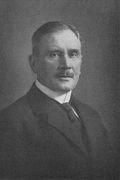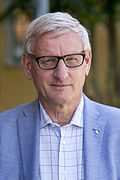# Minister for Foreign Affairs Date of birth Age at ascension(first term) Time in office(total) Age at retirement(last term) Date of death Longevity 1 Oscar Björnstjerna (1819-03-06 ) 6 March 1819 57 years, 14 days 4 years, 30 days 61 years, 44 days (1905-09-02 ) 2 September 1905 86 years, 180 days 2 Carl Hochschild (1831-09-13 ) 13 September 1831 48 years, 227 days 5 years, 151 days 54 years, 12 days (1898-12-12 ) 12 December 1898 67 years, 90 days 3 Albert Ehrensvärd, Sr. (1821-01-10 ) 10 January 1821 64 years, 258 days 3 years, 260 days 68 years, 153 days (1901-01-31 ) 31 January 1901 80 years, 21 days 4 Gustaf Åkerhielm (1833-06-24 ) 24 June 1833 55 years, 353 days 0 years, 122 days 56 years, 110 days (1900-04-02 ) 2 April 1900 66 years, 282 days 5 Carl Lewenhaupt (1835-03-19 ) 19 March 1835 54 years, 207 days 5 years, 232 days 60 years, 74 days (1906-12-10 ) 10 December 1906 71 years, 266 days 6 Ludvig Douglas (1849-11-24 ) 24 November 1849 45 years, 189 days 4 years, 134 days 49 years, 323 days (1916-07-20 ) 20 July 1916 66 years, 239 days 7 Alfred Lagerheim (1843-10-04 ) 4 October 1843 56 years, 77 days 4 years, 353 days 61 years, 64 days (1924-05-23 ) 23 May 1924 80 years, 232 days 8 August Gyldenstolpe (1849-07-22 ) 22 July 1849 55 years, 153 days 0 years, 223 days 56 years, 11 days (1928-06-30 ) 30 June 1928 78 years, 344 days 9 Fredrik Wachtmeister (1855-02-10 ) 10 February 1855 50 years, 173 days 0 years, 97 days 50 years, 270 days (1919-09-06 ) 6 September 1919 64 years, 208 days 10 Eric Trolle (1863-09-23 ) 23 September 1863 41 years, 349 days 3 years, 130 days 45 years, 114 days (1934-04-21 ) 21 April 1934 70 years, 149 days 11 Arvid Taube (1853-01-19 ) 19 January 1853 56 years, 101 days 2 years, 160 days 58 years, 261 days (1916-10-14 ) 14 October 1916 63 years, 269 days 12 Albert Ehrensvärd, Jr. (1867-05-09 ) 9 May 1867 44 years, 151 days 2 years, 133 days 46 years, 284 days (1940-03-06 ) 6 March 1940 72 years, 302 days 13 Knut Wallenberg (1853-05-19 ) 19 May 1853 60 years, 274 days 3 years, 41 days 63 years, 315 days (1938-06-01 ) 1 June 1938 85 years, 13 days 14 Arvid Lindman (1862-09-19 ) 19 September 1862 46 years, 55 days 0 years, 203 days 48 years, 198 days (1936-12-09 ) 9 December 1936 74 years, 81 days 15 Johannes Hellner (1866-04-22 ) 22 April 1866 51 years, 180 days 2 years, 143 days 53 years, 323 days (1947-02-19 ) 19 February 1947 80 years, 303 days 16 Erik Palmstierna (1877-11-10 ) 10 November 1877 42 years, 121 days 0 years, 231 days 42 years, 352 days (1959-10-22 ) 22 October 1959 81 years, 346 days 17 Herman Wrangel (1857-08-13 ) 13 August 1857 63 years, 75 days 0 years, 351 days 64 years, 61 days (1934-10-09 ) 9 October 1934 77 years, 57 days 18 Hjalmar Branting (1860-11-23 ) 23 November 1860 60 years, 324 days 1 year, 188 days 62 years, 147 days (1925-02-24 ) 24 February 1925 64 years, 93 days 19 Carl Hederstierna (1861-12-01 ) 1 December 1861 61 years, 139 days 0 years, 206 days 61 years, 345 days (1928-11-17 ) 17 November 1928 66 years, 352 days 20 Erik Marks von Würtemberg (1861-05-11 ) 11 May 1861 62 years, 184 days 0 years, 342 days 63 years, 160 days (1937-07-22 ) 22 July 1937 76 years, 72 days 21 Östen Undén (1886-08-25 ) 25 August 1886 38 years, 54 days 18 years, 282 days 76 years, 25 days (1974-01-14 ) 14 January 1974 87 years, 142 days 22 Eliel Löfgren (1872-03-15 ) 15 March 1872 54 years, 84 days 2 years, 117 days 56 years, 201 days (1940-04-08 ) 8 April 1940 68 years, 24 days 23 Ernst Trygger (1857-10-27 ) 27 October 1857 70 years, 341 days 1 years, 248 days 72 years, 223 days (1943-09-23 ) 23 September 1943 85 years, 331 days 24 Fredrik Ramel (1872-12-09 ) 9 December 1872 57 years, 180 days 2 years, 109 days 59 years, 290 days (1947-10-30 ) 30 October 1947 74 years, 325 days 25 Rickard Sandler (1884-01-29 ) 29 January 1884 48 years, 239 days 6 years, 345 days 55 years, 318 days (1964-11-12 ) 12 November 1964 80 years, 288 days 26 Karl Gustaf Westman (1876-08-18 ) 18 August 1876 59 years, 306 days 0 years, 101 days 60 years, 41 days (1944-01-24 ) 24 January 1944 67 years, 159 days 27 Christian Günther (1886-12-05 ) 5 December 1886 53 years, 8 days 5 years, 230 days 58 years, 238 days (1966-03-06 ) 6 March 1966 79 years, 91 days 28 Torsten Nilsson (1905-04-01 ) 1 April 1905 57 years, 171 days 8 years, 284 days 66 years, 90 days (1997-12-14 ) 14 December 1997 92 years, 257 days 29 Krister Wickman (1924-04-13 ) 13 April 1924 47 years, 78 days 2 years, 126 days 49 years, 204 days (1993-09-10 ) 10 September 1993 69 years, 150 days 30 Sven Andersson (1910-04-05 ) 5 April 1910 63 years, 212 days 2 years, 340 days 66 years, 186 days (1987-09-21 ) 21 September 1987 77 years, 169 days 31 Karin Söder (1928-11-30 ) 30 November 1928 47 years, 313 days 2 years, 10 days 49 years, 322 days (2015-12-19 ) 19 December 2015 87 years, 19 days 32 Hans Blix (1928-06-28 ) 28 June 1928 50 years, 112 days 0 years, 359 days 51 years, 106 days Living years, 162 days (Living)33 Ola Ullsten (1931-06-23 ) 23 June 1931 48 years, 111 days 2 years, 361 days 51 years, 107 days (2018-05-28 ) 28 May 2018 86 years, 339 days 34 Lennart Bodström (1928-04-20 ) 20 April 1928 54 years, 171 days 3 years, 9 days 57 years, 180 days (2015-04-30 ) 30 April 2015 87 years, 10 days 35 Sten Andersson (1923-04-20 ) 20 April 1923 62 years, 180 days 5 years, 352 days 68 years, 167 days (2006-09-13 ) 13 September 2006 83 years, 210 days 36 Margaretha af Ugglas (1939-01-05 ) 5 January 1939 52 years, 272 days 3 years, 3 days 55 years, 275 days Living years, 336 days (Living)37 Lena Hjelm-Wallén (1943-01-14 ) 14 January 1943 51 years, 266 days 4 years, 0 days 55 years, 266 days Living years, 327 days (Living)38 Anna Lindh (1957-06-19 ) 19 June 1957 41 years, 110 days 4 years, 339 days 46 years, 84 days (2003-09-11 ) 11 September 2003 46 years, 84 days 39 Laila Freivalds (1942-06-22 ) 22 June 1942 61 years, 110 days 2 years, 162 days 63 years, 272 days Living years, 168 days (Living)40 Jan Eliasson (1940-09-17 ) 17 September 1940 65 years, 219 days 0 years, 165 days 66 years, 19 days Living years, 81 days (Living)41 Carl Bildt (1949-07-15 ) 15 July 1949 57 years, 83 days 7 years, 362 days 65 years, 80 days Living years, 145 days (Living)42 Margot Wallström (1954-09-28 ) 28 September 1954 60 years, 5 days 4 years, 342 days 64 years, 347 days Living years, 70 days (Living)43 Ann Linde (1961-12-04 ) 4 December 1961 57 years, 280 days 3 years, 38 days 60 years, 318 days Living years, 3 days (Living)44 Tobias Billström (1973-12-27 ) 27 December 1973 48 years, 295 days 1 years, 328 days 50 years, 258 days Living years, 345 days (Living)45 Maria Malmer Stenergard (1981-03-23 ) 23 March 1981 43 years, 171 days year, 88 days (Ongoing)Incumbent Living years, 259 days (Living)























































